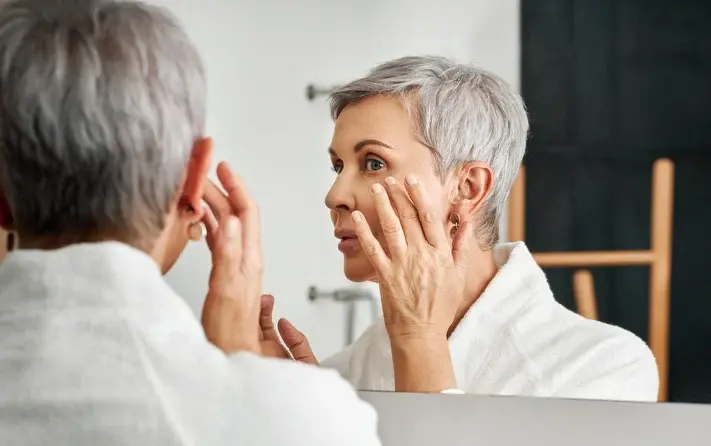HOW TO CARE FOR YOUR SKIN DURING MENOPAUSE
- karinmatey5
- Mar 20
- 3 min read

As you age and enter menopause, your skin will inevitably change—and that’s completely normal! You can prepare for these transformations by adapting your skincare routine to meet your evolving needs.
THE SCIENCE BEHIND MENOPAUSE
During menopause, your body produces significantly less estrogen and progesterone, the two hormones responsible for collagen production. Since about 70 percent of your skin is made of collagen, this decreased production will weaken your skin structure and support, leading to the hallmark signs of aging.
WHAT ARE COMMON MENOPAUSE SKIN CHANGES?
our age and enter menopause, your skin will inevitably change—and that’s completely normal! You can prepare for these transformations by adapting your skincare routine to meet your evolving needs. This guide will show you how to navigate menopause skin changes, so your skin remains
THE SCIENCE BEHIND MENOPAUSE
During menopause, your body produces significantly less estrogen and progesterone, the two hormones responsible for collagen production. Since about 70 percent of your skin is made of collagen, this decreased production will weaken your skin structure and support, leading to the hallmark signs of aging.
WHAT ARE COMMON MENOPAUSE SKIN CHANGES?Dry Skin: Collagen keeps your skin firm, plump and hydrated by retaining moisture—so as estrogen levels drop, your skin will experience the opposite effects. This can result in dry, flaky and itchy skin.
Thinness: Collagen is responsible for the thickness of your skin. As it decreases during menopause, your skin can become thinner and more fragile.
Wrinkles: With less collagen to keep your skin firm and plump, wrinkles may become more apparent.
Acne: Fluctuations in hormone levels can cause an increase in sebum (oil) production, leading to breakouts.
Pigmentation/Sun Spots: Hormonal changes during menopause can also cause changes in skin pigmentation, leading to dark spots or patchy skin.
More Facial Hair: As estrogen levels decrease, testosterone can become more dominant, leading to unwanted facial hair growth.
Many of these changes also exacerbate existing skin conditions. As the skin barrier weakens and loses moisture, it can worsen eczema, rosacea and psoriasis symptoms.
HOW TO CARE FOR YOUR MENOPAUSE SKIN CHANGES
You can adapt your skincare routine with simple adjustments to cater to these skin changes.
1. CLEANSE DAILY
Menopause can increase skin sensitivity to environmental aggressors, so cleanse your face twice a day with a gentle cleanser to remove impurities. Use our Gel cleanser to gently exfoliate and hydrate your skin.
2. STAY HYDRATED
As your skin becomes drier during menopause, it's essential to hydrate from the inside out. Drink plenty of water throughout the day and incorporate hydrating and moisturizing products into your skincare routine. Look for ingredients like:
Hyaluronic acid, found in our Peptide serum
Aloe vera
Glycerin
Ceramides
Shea butter
Squalane
3. USE SUN PROTECTION
Protecting your skin from the sun is always important but even more so during menopause. Hormonal changes can make your skin more susceptible to UV damage and sun spots. Wear sunscreen with at least SPF 30 daily, and reapply every two hours you’re outdoors.
You can even find a broad-spectrum sunscreen that’s ultra-light, hydrates your skin and fights environmental aggressors, like our Hydrating Protection with SPF 50
4. INCORPORATE ANTI-AGING TREATMENTS
To address the loss of collagen, start using anti-aging treatments in your skincare routine. Look for products containing retinol, peptides and antioxidants to promote collagen production and diminish the appearance of fine lines and wrinkles. Use our Hydrating Cleanser for your second cleanse to give your skin extra firmness.
5. ADDRESS SENSITIVITY AND IRRITATION
If you've noticed menopause skin changes like increased skin sensitivity, look for products specifically designed for sensitive skin. Avoid harsh ingredients like alcohol and synthetic fragrances, which can irritate your skin further.
6. FIND HEALTHY LIFESTYLE MODIFICATIONS
Research and adopt a balanced diet rich in antioxidants, vitamins and omega-3 fatty acids to support skin health from within. Regular exercise can also help improve circulation and promote a healthy glow.




Comments